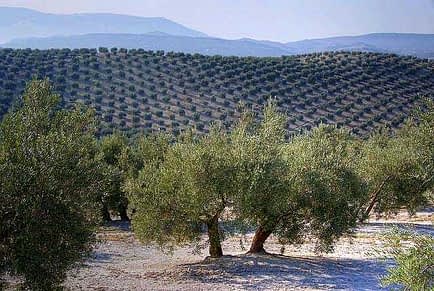Jaén’s olive oil producers say their next harvest will be just half of this year’s record output.
Having produced the majority of Spain’s 1.6 million tons of olive oil this year — and in the wake of one of the driest winters in their lifetimes — they are expecting a dismal 2013.
Just how dismal will be clearer in a few weeks, said Cristóbal Gallego, an olive oil sector spokesman for Andalusian Federation of Agricultural Cooperative Enterprises (FAECA). By then the estimates will be firmer but it is already clear that certain parts of the world’s production capital have been hard hit by drought then frosts, he told EFE last week.
“If prices stay low and if the forecasts of such a reduced output prove accurate, the province of Jaén is going to suffer greatly, because that will further reduce the incomes of producers.”
His fears come as Spain accepts what could be up to a €100 billion ($125b) European bailout for its banks and with most Spaniards already resigned to a bleak future with more austerity measures to come.
Cioloş action plan imminent
European Commissioner for Agriculture Dacian Cioloş’s proposed action plan for the olive oil sector is expected to be debated by ministers from Europe’s producer countries at a meeting on June 18.
The plan is to be released publicly later this month and to include improvements in quality control, consumer protection and labeling as well as structural changes to promote sustainability.
Olive oil consumption down slightly in Spain
The latest household consumption survey in Spain shows a 0.2 percent drop for edible oils. Olive oil consumption is down 0.2 percent and sunflower oil 0.8 percent season-on-season for April 2011 to March this year.
Deoleo announces €20m promotion campaign
Meanwhile, EFE reports that olive oil giant Deoleo (formerly SOS) is to invest €20 million ($25m) to promote its brands in emerging markets, where the margins are better, and not in Spain, where the market is well-established and consumption is not expected to increase.
Speaking after the group’s annual general meeting in Madrid on June 6, Deoleo chief Jaime Carbó said it was time to focus on more profitable markets, such as China and Brazil, where the group’s brands have enjoyed growth of 56 and 28 percent respectively.
It’s estimated that one in every five olive oil bottles sold worldwide already pertains to Deoleo.
Non-producers Germany, the UK and Austria among biggest exporters to Hungary
Lastly, according to a Spanish Institute of Foreign Trade (ICEX) report on the foundling olive oil trade in Hungary, Italy has the biggest market share — 45 percent — but it and, to a worse extent, Greece, are losing ground to countries that traditionally weren’t exporters, namely the United Kingdom, Germany and Austria.
The three now together hold a 16 percent market quota and have achieved it largely via exports of white label olive oil products from big production companies based in those countries, such as Unilever, which has its headquarters in the UK.
The report says that the UK is particularly strong in the refined olive oil segment and Germany in lampante.
Sunflower oil is the leader of fats and oils used in Hungary, with 65 percent of the market, while olive oil — which is a third more expensive — has just 2 percent.

